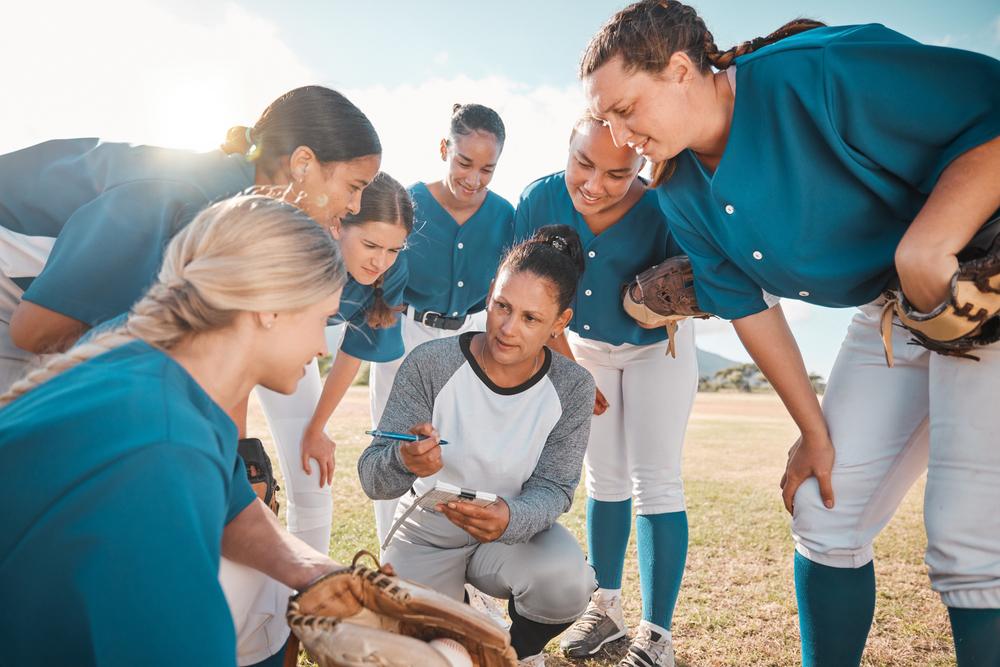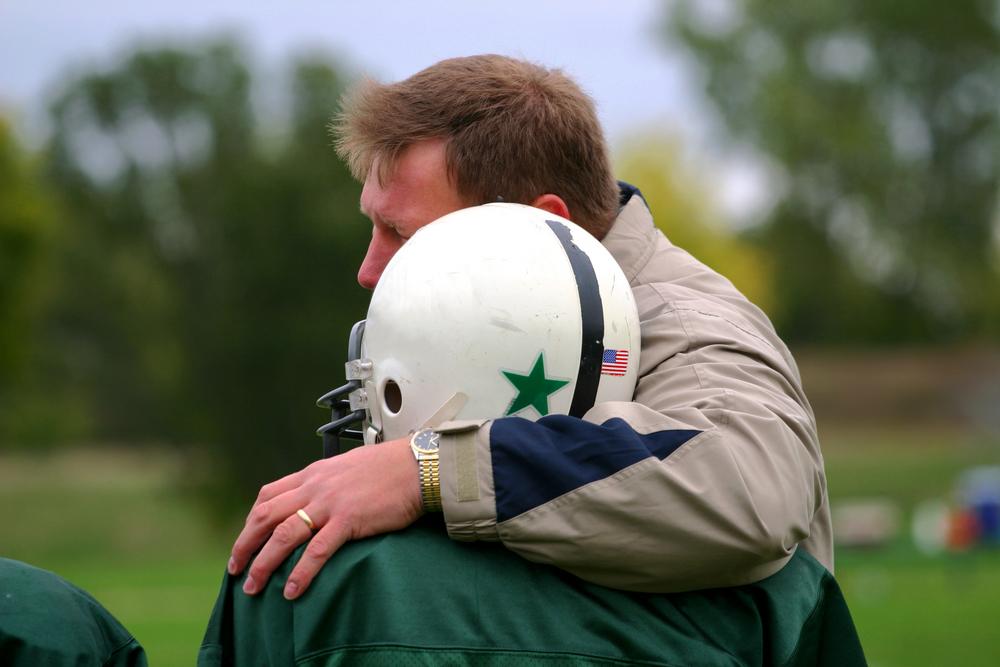Kara Winger: I’m Kara Winger, your host for the TrueSport Expert Series 2022. We’re here at the U.S. Olympic and Paralympic Museum in Colorado Springs.
Dr. Kevin Chapman: Yeah, we got the scoreboard behind us and everything, don’t we?
Kara Winger: This is the scoreboard from the 1980 Olympic Games where the U.S. hockey team beat Russia in the final moments. Historic moment.
Dr. Kevin Chapman: Yeah for sure.
Kara Winger: So, our episode today with Dr.Kevin Chapman is titled, “It Takes One to Know One. What does that mean?
Dr. Kevin Chapman: Yeah. So, that’s a loaded topic because it’s really a double meaning honestly. So, when we talk about it takes one to know one being a license psychologist, I specialize in emotional disorders and anxiety and things like that. So, I did a webinar at one point and I really illustrated how if you think about one emotion, you can understand all emotions because there are significant overlap across emotions. So, in that particular webinar, I was talking specifically about men who struggle with anxiety, sadness, and anger. And at face value you really don’t see those as being very similar, but ultimately being a man myself, but also recognizing that sadness, anger, and anxiety, if you understand the function of an emotion, meaning why you have emotions, it’s really easy to understand all of them because they all serve an adaptive purpose in our lives. If we know how to pay attention to them.
Kara Winger: And maybe like where they sort of manifest in your body, like it sounds like those three emotions could be pretty similar in terms of how you react to them. Everyone is different, obviously, but once you feel the sensation of an emotion, you might be more familiar with the ones that are coming down the pipeline.
Dr. Kevin Chapman: And that’s precisely the point, right? Your point is well taken is that if you think about all emotions they have three parts. Most people talk about feelings. They’re like, I feel like you shouldn’t have said that to me. That’s not a feeling. That’s actually a thought. But most people in society talk about emotions like they’re feelings but when in reality, all emotions have three parts. We have thoughts, we have physical feelings in our body, and we have behaviors. So, when you understand that all emotions have those same three components and they’re interrelated, then you have a better understanding that the physiological arousal of anger and anxiety and fear and disgust and things like that are all pretty heightened. Right? But with sadness, they all go down because it serves a different purpose.
Kara Winger: Yeah, very cool. I’ve never been afraid of feeling my feelings, but maybe I’ve never been afraid of thinking my thoughts.
Dr. Kevin Chapman: Right. That makes sense.
Kara Winger: Wild. How does understanding the source of your emotions, like you said, there are three parts. How does, maybe understanding that, help a youth athlete grow in handling them?
Dr. Kevin Chapman: Yeah, that’s a great question. I think in many ways when we think about emotions, most people kind of play the victim. And what I mean by that is we assume that things cause our emotional experiences when in reality things trigger our emotional experiences. So, it gives me a sense of control if I’m able to regulate and understand that the reason I’m experiencing anger, which is normal, is because this event precipitated it, right? Or if I’m anxious, it’s normal to be anxious about competition. Right? I had a football coach here in high school used to say, “If you ain’t hype, something ain’t right.” And that’s recognizing that anxiety serves an adaptive purpose. It’s a matter of how you regulate it and allow that to help you respond to have an optimal performance. So, it’s not a matter of not having the emotion, it’s where am I with the emotion so that it helps me navigate any situation that presents itself.
Kara Winger: Right. My high school javelin coach would say, “It’s OK to be nervous. It means that you care.”
Dr. Kevin Chapman: Exactly.
Kara Winger: Yes, and I’ve been all around the world throwing the javelin. I still get nervous. That’s kind of always my cue that like this, this is still really important to me. I love it. And it’s OK to feel these feelings because it’s my cue that it’s a big deal.
Dr. Kevin Chapman: That’s a great point. You should be nervous, right? Because if you’re not, you’re going to go out there and be like, oh, here we go, right? And you’re not going to have a good throw. But if you’re too nervous, you’re going to be tense and tight and mechanics will be off. But if it’s optimal, that’s when we PR and things like that.
Kara Winger: Yeah. So, knowledge is power, right? If you know how emotions work, if you know maybe how your body reacts to certain emotions or that nervousness, you can then take action to like not necessarily combat it, but make those physical reactions to that emotion work in your favor.
Dr. Kevin Chapman: Indeed. Right. So, it’s about regulation. It’s not about getting rid of, suppressing because that backfires anyway. And if I push an emotion away basically it maintains it, it makes it worse long term. So, it’s a matter of how do I use it and respond to what it’s trying to tell me. Emotions are trying to communicate important information. So, when we recognize as an athlete that anger, anxiety, sadness, all of those emotions serve a purpose. We have to learn to pay attention to it as a young athlete. And that’s going to make us better adults later.
Kara Winger: Right. You know, I feel like I did OK at this sports psychology stuff for a long time, but I’m going into my last season as a javelin thrower. I started therapy right before New Year’s. And it’s been wonderful because I can separate kind of me as a whole human being from this athlete life that I’ve led and think about my emotions in a different way and then apply them back to this last season that I want to get everything I can out of it and just really pay homage to the 20 years of my career.
Dr. Kevin Chapman: That’s an excellent point. Well, obviously I’m a fan that you’re doing that, right? Because ultimately there’s a big I with you care. And what I mean by big I’s that you’re a lot of things. You’re not just an athlete, you’re a whole lot of things, right? You’re a spouse, you’re a daughter. And when you can understand, right, that I have these aspects of me that’s not just an athlete, that’s a part of my identity. But that’s not the only part of my identity. It makes you complete in that way. So, that’s good.
Kara Winger: And then you bring your whole self to the runway instead of just this piece of you. And I really have enjoyed kind of giving myself that space.
Dr. Kevin Chapman: Yeah, that’s good.
Kara Winger: Yeah. So, it’s been really excellent. So, I felt really lucky in my career of many different coaches. But actually very specifically, my strength coach of the last 12 years is a really good friend of mine. His wife Maggie was my matron of honor, like really close friends. Jamie Myers, my strength coach helped me in so many different ways, like as a friend and navigate emotions that kind of we both grew in this sport as coach and athlete together, and I’m so lucky to have him, but also other really great coaches that helped me manage my emotions. Like what are some tools for coaches to be able to do that effectively?
Dr. Kevin Chapman: You know, it’s a great question, Kara, because I think in many ways many coaches lack the knowledge and the skill set honestly.
Kara Winger: The emotional intelligence?
Dr. Kevin Chapman: Indeed, emotional intelligence. That’s a great point. Right. And I think many times we don’t really see coaches knowing how to navigate that because it’s not something in their tool belt, so to speak. So, what I like to tell coaches on a regular basis is that, first of all, recognizing that emotions again have three parts, but we’ve got to make emotions a regular part of the conversation. So, one strategy I like to talk about a lot is very easy, athletes like numbers, so it’s easy to remember this is what I call a three point check. All emotions have three parts. Some kids coming off the field, they’re salty, they’re upset. Something bad happened it’s like saying, take a deep breath. They take a deep breath, and then they say to themselves, what were you thinking right now? What are you thinking? What are you feeling right now in your body? What are you doing or feel like doing? That acknowledges in a very non-judgmental way what emotion I’m having right there in real time. Once they’re honest with themselves and accept that emotion, then the coach can simply say, “So what can you do right now to respond to that emotion more effectively?” Money, right? So if a coach tells a kid to do that, not only did they accept the emotion as part of the sport, but now they’re able to channel that emotion into an adaptive performance in many ways. And that’s a really quick hitter, really, a three point check.
Kara Winger: Yeah, I love that ability to process something not necessarily quickly, but in a way that allows you to still be a part of the experience with your team. So yeah, that’s not necessarily a natural thing to, like, walk away, collect yourself, come back. But if you have a coach modeling that for you or even just making that very simple suggestion, that can go a long way. In my Olympic career, you know, making four Olympic teams is amazing. But the outcome at those Games was not necessarily the dream that I had in mind and I had a captain of a college team recently ask me how do I deal with my own disappointment and still be a leader?
Dr. Kevin Chapman: Right.
Kara Winger: And for me, there isn’t really a choice like you’re either going to storm off and be upset and there’s a time and place for that for sure. You definitely have to work through those emotions like we’ve been talking about. But if you don’t go back, you don’t get to support your friends. You don’t get to be a part of other people’s experiences. And that’s been such a pleasure and privilege for me to be a part of other athletes lives. And if I just spend all my time feeling sorry for myself without dealing with it and coming back to support, I would have lost out on a lot.
Dr. Kevin Chapman: Yeah, and that’s a great point. And to your point about disappointment and being a leader, I think it’s essential for a real leader to express when they have disappointments, hang ups, and mistakes because number one, they look up to you, but also because you’re transparent and honest and approachable. So, in many ways, if I express, guys, I let you down. I’m disappointed because label that emotion right? Disappointment, which is a normal part of competition. You know that. Right? And then saying that and saying, but I’m going to make up for it. I’m going to do this and I’m going to respond differently. They’re going to be able to say that, oh, wait a second, he’s human just like I am. She’s human just like I am. If I’m disappointed, that’s a sign that I’m a human being and I can still pick myself up and go out and perform better the next time.
Kara Winger: Yes, modeling that behavior and being vulnerable so that other people can be vulnerable and grow together.
Dr. Kevin Chapman: Yes, indeed.
Kara Winger: Fabulous. Excellent advice. Thank you, Dr. Kevin Chapman. – Yeah, thank you. Absolutely. – This has been another TrueSport Expert Series in 2022.



